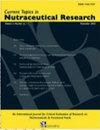中药黄连提高2型糖尿病患者肌肉耐力
IF 0.4
4区 医学
Q4 NUTRITION & DIETETICS
Current Topics in Nutraceutical Research
Pub Date : 2023-10-09
DOI:10.37290/ctnr2641-452x.21:350-355
引用次数: 0
摘要
2型糖尿病通常会导致肌肉耐力受损。本文探讨了中药黄连对2型糖尿病患者肌肉耐力的影响。为此,招募年龄在18-60岁的2型糖尿病患者,给予降糖药治疗,或降糖药加黄连20 g每日,疗程1个月。在临床环境下,所有受试者在App视频的指导下进行肌肉耐力评估。通过应用程序记录基线和干预后的肌肉耐力值并进行比较。黄连治疗组肌肉耐力高于对照组。多因素回归分析显示,下肢肌肉耐力(OR = 4.282, 95% CI: 1.537 ~ 11.928)和上腹部肌肉耐力(OR = 4.632, 95% CI: 1.847 ~ 11.618)与黄连治疗相关。综上所述,糖尿病患者下肢和上腹部肌肉耐力水平与黄连汤治疗呈正相关。这种视频引导检测方法的灵敏度与传统设备相当,更有利于临床应用。本文章由计算机程序翻译,如有差异,请以英文原文为准。
Traditional Chinese Medicine Huanglian Improves Muscular Endurance in Type 2 Diabetes Patients
Type 2 diabetes often leads to compromised muscle endurance. Herein, we have explored the effect of Huanglian, a traditional Chinese medicine herb, on muscle endurance in patients with type 2 diabetes. To this end, type 2 diabetes patients aged 18–60 years were recruited and treated with anti-diabetic drugs, or anti-diabetic drugs plus 20 g of Huanglian daily, for one month. All subjects were instructed in muscle endurance assessment guided by the videos from the App in the clinic setting. The baseline and post-intervention muscle endurance values were recorded through the app and compared. The treatment group receiving Huanglian had higher muscle endurance than the control group. Multivariate regression analysis showed that lower limb muscle endurance (OR = 4.282, 95% CI: 1.537–11.928) and upper abdominal muscle endurance (OR = 4.632, 95% CI: 1.847–11.618) were correlated with Huanglian treatment. In conclusion, the level of muscle endurance of the lower limbs and upper abdominals is positively correlated with Huanglian decoction treatment in diabetic patients. The sensitivity of this video-guided test method is comparable to that of traditional equipment and more conducive to clinical application.
求助全文
通过发布文献求助,成功后即可免费获取论文全文。
去求助
来源期刊
CiteScore
1.10
自引率
0.00%
发文量
36
审稿时长
>12 weeks
期刊介绍:
Current Topics in Nutraceutical Research is an international, interdisciplinary broad-based peer reviewed scientific journal for critical evaluation of research on chemistry, biology and therapeutic applications of nutraceuticals and functional foods. The major goal of this journal is to provide peer reviewed unbiased scientific data to the decision makers in the nutraceutical and food industry to help make informed choices about development of new products.
To this end, the journal will publish two types of review articles. First, a review of preclinical research data coming largely from animal, cell culture and other experimental models. Such data will provide basis for future product development and/or human research initiatives. Second, a critical evaluation of current human experimental data to help market and deliver the product for medically proven use. This journal will also serve as a forum for nutritionists, internists, neurologists, psychiatrists, and all those interested in preventive medicine.
The common denominator of all of the topic to be covered by the journal must include nutraceuticals and/functional food. The following is an example of some specific areas that may be of interest to the journal. i) Role of vitamins, minerals, antioxidants and phytonutrients on cardiovascular health, cancer, diabetes, ocular health, mental health, men’s health, women’s health, infant nutrition, ii) Role of herbals on human health, iii) Dietary supplements and sleep, iv) Components of diet that may have beneficial effect on human health, v) regulation of apoptosis and cell viability, vi) Isolation and characterization of bioactive components from functional foods, vii) Nutritional genomics, and viii) Nutritional proteomics.

 求助内容:
求助内容: 应助结果提醒方式:
应助结果提醒方式:


